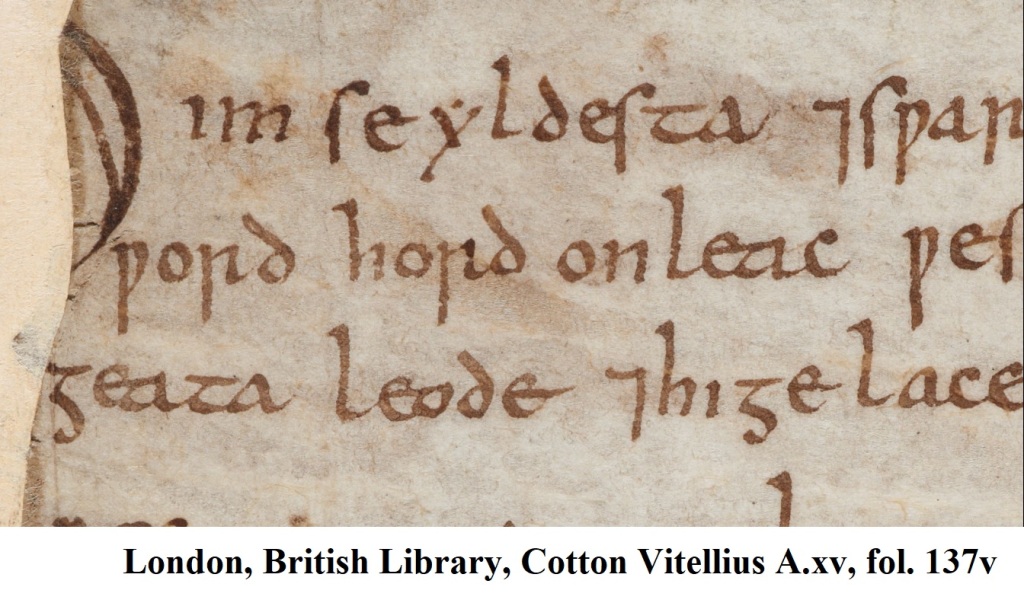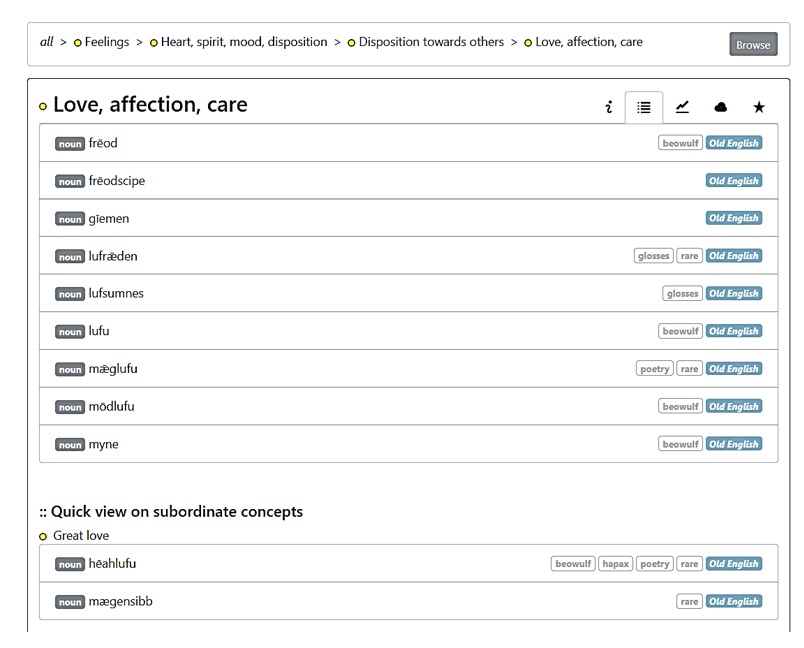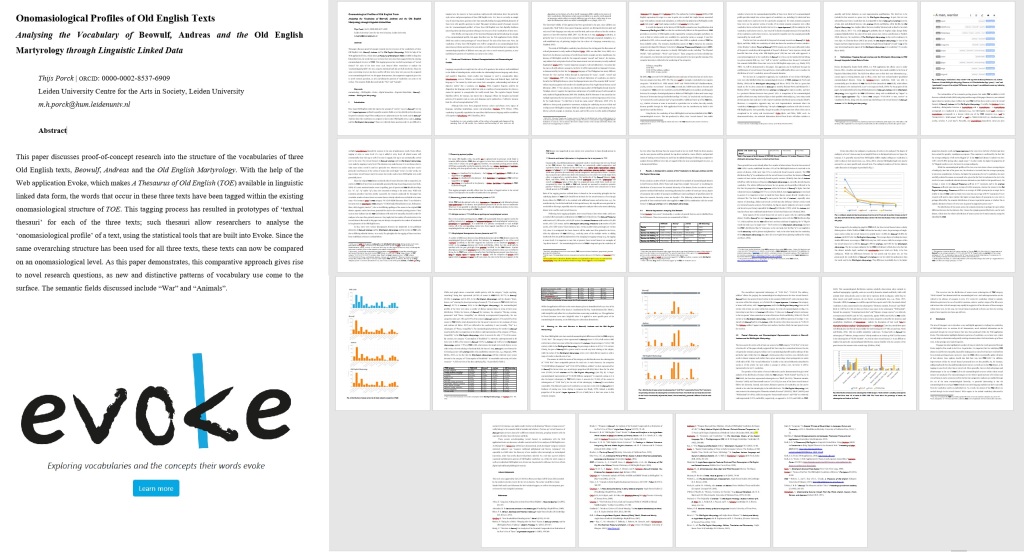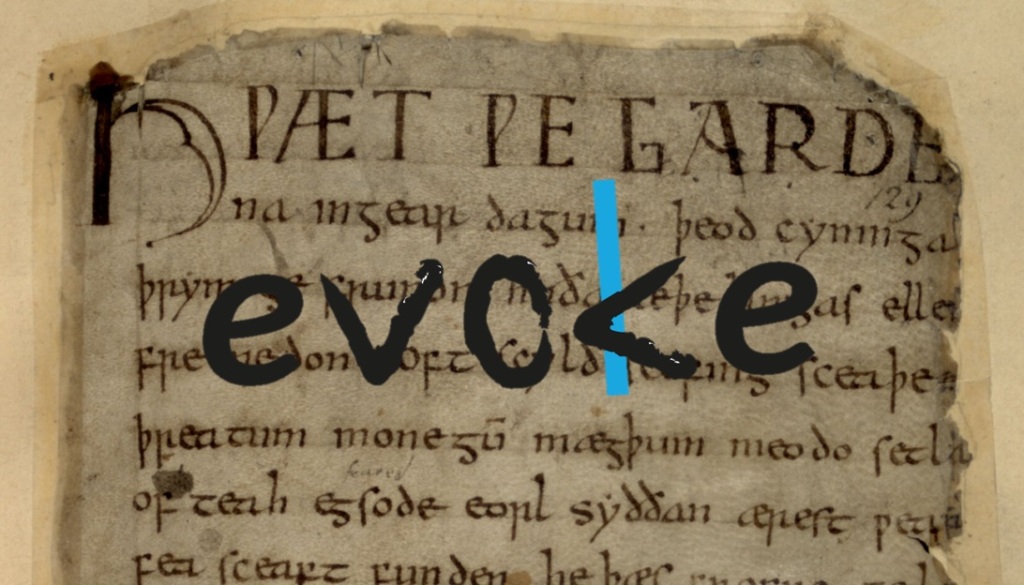This blog post introduces a new online tool to explore the vocabulary of the Old English poem Beowulf. The tool is freely available and can offer unique new insights into the vocabulary of early medieval England’s best-known epic.
When a poet unlocks his word-hoard: The vocabulary of Beowulf

When Beowulf arrives in Denmark, he introduces himself and his men to a coast guard. The poet describes this action with the words “word hord onleac” [he unlocked his word hoard], creating the stunning image of an individual’s vocabulary as a treasure chest that can be unlocked. Over the years, many scholars have tried to access the Beowulf-poet’s own ‘word-hoard’ (consisting of over 3000 words) in order to open it up for analysis. Arthur Brodeur, in his classic study The Art of Beowulf (Berkeley, 1959), for instance praised the poet’s diction as “more vigorous, stately, and beautiful than that of any other Old English poem” (p. 38). In particular, scholars have praised the poet’s use of compound words, noting that a substantial number of these (over 600) are not found in any other Old English text (they are so-called hapax legomona). These hapaxes include morþor-bed ‘murder-bed’, sadol-beorht ‘made bright by a saddle’, fore-snotor ‘very intelligent’ and, my personal favourite, hleor-bolster ‘pillow; lit. cheek-bed’. A conventional approach to the vocabulary of Beowulf is to focus on words that belong to one given semantic field, e.g., ‘monster’, ‘sea’, ‘hall’ or ‘warrior’, and discuss how the poet’s treatment of the words denoting that concept differs from other texts in the Old English corpus. Such traditional analyses are highly insightful but they all rely on intensive, manual labour; essentially, one needs to leaf through a paper glossary of the text and mark words by hand. However, there is now a digital solution!
Introducing the Beowulf Thesaurus!
Do you want to know how many and which words the Beowulf poet used for such concepts as the colour black, affection, anger and a bench? The brand-new digital Beowulf Thesaurus can easily help you answer these questions: 3 words denoting black/blackness (blæc, sweart and wann), 5 words with the sense ‘love, affection, care’ (frēod, lufu, mōdlufu, myne and heahlufu), 3 words for ‘anger, wrath, fury’ (ierre, torn and wielm) and another 5 words that mean ‘bench, seat’ (benc, bencþel, sess, setl, ealubenc and medubenc)! These may seem like basic questions and answers, but they can be the starting point for interesting analyses of the poem: which emotion is best represented in the poem’s diction? How about animals, colours and actions? You can find it out for yourselves because the Beowulf Thesaurus is freely available online.
So, how does the Beowulf Thesaurus actually work?
You can go to its landing page http://evoke.ullet.net/content/beowulf/ , skip some of the technical description and scroll down to ‘ACCESS’ and click on ‘Explore in Evoke (alongside a Thesaurus of Old English)’. Evoke is a web application developed by Sander Stolk that allows you to browse (and analyse and annotate) thesaurus contents (see his non-technical explanation here; if you want more technical information see this Open Access article). You can use the search box in the top-right corner or browse the thesaurus by clicking on the ‘semantic tree’ with yellow blobs. To find words denoting the concept of ‘affection’, you type ‘affection’ in the search box and click on ‘Love, affection, care’ or you can click your way through the semantic tree via ‘Feelings’ > ‘Heart, spirit, mood, disposition’ > ‘Disposition towards others’ to “Love, affection, care”. Once you’ve done that, you will be given an overview of all Old English words denoting that particular concept along with usage information (e.g., whether that word is mostly used in poetry) – all of this data is taken from Glasgow’s Thesaurus of Old English. If you are using tie Beowulf Thesaurus in Evoke, you can also see which words occur in Beowulf, see the screenshot below:

This overview tells you what words were available to denote the concept ‘Love, affection, care’; it tells you which words are considered ‘rare’ (e.g., mæglufu, lufræden and mægensibb), which words are restricted to poetry or glosses and, crucially, which words are found in Beowulf! And you can do the same for any concept imaginable, ranging from weapons to water, from horses to humility, and from actions to armpits (though the two Old English words for ‘armpit’, ōcusta and ōxn, are only found in glosses and not in Beowulf). Go out and explore the Beowulf Thesaurus yourself! http://evoke.ullet.net/content/beowulf/
Do more than just explore: Evoke as a research tool
Exploring the vocabulary of Beowulf by looking up words for concepts is only one way of using the application Evoke to learn more about Old English vocabulary. Within the same application, we have also made available digital thesauri of the Old English poem Andreas and the Old English Martyrology and using Evoke’s statistical tools one can also compare the words in these different texts and bring to the surface new and unnoticed patterns of vocabulary use. I wrote an article about this kind of research which is freely available – you can read it by clicking on the image below (but be warned: there will be graphs, tables and numbers!):

This kind of statistical analysis may not be for everyone, but I do hope you will give browsing the digital Beowulf Thesaurus a try! We also hope to make available a series of online lessons to help you explore the vocabulary of Old English (as well as individual Old English texts) via the web application Evoke – so watch this space and, for now, enjoy unlocking the word-hoard and exploring the epic!

